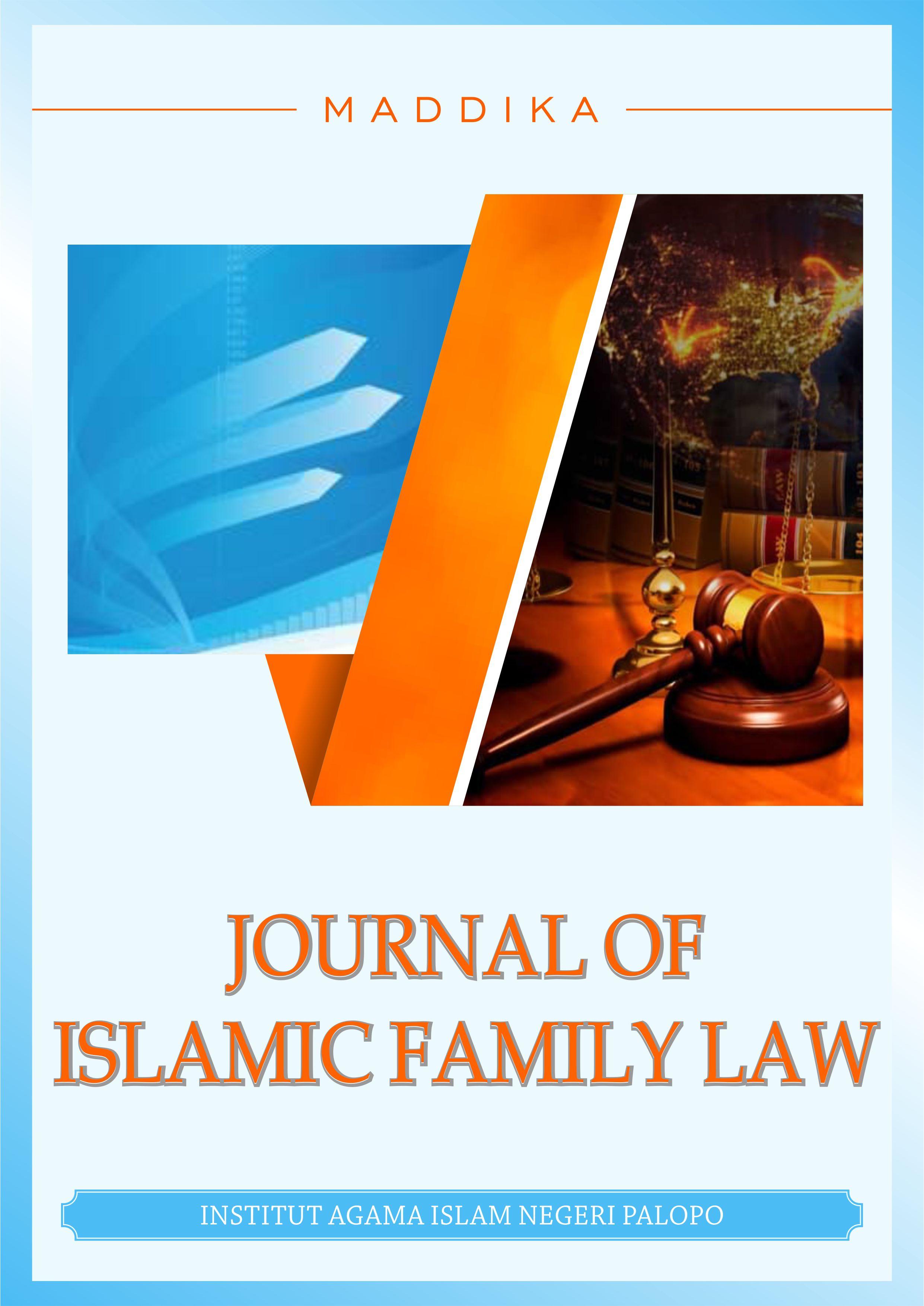PANDANGAN HUKUM ISLAM TERHADAP ADAT MADDOJA DI KECAMATAN BAROKO KABUPATEN ENREKANG
DOI:
https://doi.org/10.24256/maddika.v5i1.5107Abstract
The subject of this study is the process of implementation and views of Islamic law on the Madoja custom in Baroko District, Enrekang Regency. This type of research uses a kind of field research with qualitative research methods, namely direct research into the field to visit the object of research, while the data sources used in this study are primary and secondary data, the data collection techniques in this study are observation, interviews, and documentation, data management techniques, namely editing, and concluding. The subject matter consists of two sub problems, namely how is the procession in the implementation of the Madoja tradition carried out by the people of Fort Alla Utara Village, Baroko District, Enrekang Regency and how does Islamic law view the Madoja custom in Baroko District, Enrekang Regency. The results of this study show that the process of implementing the Madoja Tradition starts from the event of Pamula kamatean, Mak randuk bongi, Mak bongi pitu, Mak papura and Mak patang pulo after the death of the mayit. In implementing the Madoja Tradition, several stages of traditional processions are considered sacred and essential to be carried out, namely Mapopellao kandean (Lowering the Spirit), which is the process of carrying the spirit to the afterlife. Thus, implementing the Madoja tradition is categorized as permissible as long as it is in line with Islamic law and the benefits contained in its implementation.
References
Abu Abdullah Muhammad bin Yazid Al-Qazwiiniy, Sunan IbnuMajah, Kitab. Al-Janaa-iz, Juz 1, No. 1612, (Beirut-Libanon: Darul Fikri, 1981 M).
Abu Daud Sulayman ibn al-asy’ats ibn Ishaq al-Azdi as-Sijistani, Sunan Abu Daud, Kitab. Talak, Juz 2, No. 2201, (Beirut-Libanon: Darul Kutub ‘Ilmiyah, 1996 M).
Ainun Hanami (28 Tahun), Wawancara Salah Seorang Tokoh Agama Muhammadiyah Di Desa Benteng Alla Utara Kecamatan Baroko, 30 Desember 2023, Jam 17:02 Wita
Ambe Padeng (80 Tahun), Wawancara Salah satu Masyarakat adat di desa Benteng Alla Utara, 5 september 2023, jam 14:20 Wita.
Amir, R. (2021). Tinjauan Hukum Islam Terhadap Tradisi Mangdoja Dalam Upacara Kematian. Qadauna: Jurnal Ilmiah Mahasiswa Hukum Keluarga Islam , 3 (1), 208-225.
Atto Sainal (70 Tahun), Wawancara Salah seorang tokoh adat di kecamatan Baroko, 5 september 2023, jam 17:08 Wita.
Atto Sainal(70 Tahun), Wawancara Salah seorang tokoh adat di kecamatan Baroko, 5 september 2023, jam 17:08 Wita.
Atto Sainal(70 Tahun), Wawancara Salah seorang tokoh adat di kecamatan Baroko, 5 september 2023, jam 17:08 Wita
Hamida, H., Ridha, M. R., & Jumadi, J. (2020). Masyarakat Adat Tangsa di Enrekang Sulawesi Selatan, 2004-2018. Chronologia, 2(1), 17-29.
Ibn Qudamah al-Muqaddasy, al-Mughny (Beirut: Dar al-Fikr, 1405) Juz II, 214.
Ilham Syawal (32 Tahun), Wawancara Salah Seorang Tokoh Agama Hidayatullah di Desa Benteng Alla Utara Kecamatan Baroko, 25 Desember 2023, Jam 16:09 Wita.
Indo Milu(75 Tahun), Wawancara Salah seorang warga Desa Benteng Alla Utara Kecamatan Baroko, 5 September 2023, Jam 17:33 Wita.
Indo Nenni(58 tahun), Wawancara Salah satu masyarakat adat di desa Benteng Alla Utara, 5 september 2023, jam 15:32 Wita.
Kementrian Agama RI al-Qur’an dan Terjemahannya, Bandung: Cordoba, Mei 2019).
Muhammad Amin, Hasyiyah Radd al- Muhtar ‘ala al-Dar al Muhtar (Beirut: Dar al-Fikr, 1386) juz II.
Pak Rahman(79 Tahun), Wawancara Ketua adat di desa Benteng Alla Utara kecamatan Baroko, 8 september 2023, jam 14:12 Wita.
Yahya, M. A. (2019). Tradisi petik matai dalam perkawinan suku rejang di kelurahan tanjung agung kecamatan pelabai kabupaten lebong menurut perspektif hukum islam (Doctoral dissertation, IAIN Curup).
Downloads
Published
How to Cite
Issue
Section
Citation Check
License
Copyright (c) 2024 Rahmawati Ad, rahmawati ad

This work is licensed under a Creative Commons Attribution-NonCommercial-ShareAlike 4.0 International License.
Authors who publish in this journal agree to the following terms:
- Authors retain copyright and grant the journal right of first publication with the work simultaneously licensed under a Creative Commons Attribution License that allows others to share the work with an acknowledgment of the work's authorship and initial publication in this journal.
- Authors can enter into separate, additional contractual arrangements for the non-exclusive distribution of the journal's published version of the work (e.g., posting it to an institutional repository or publishing it in a book), with an acknowledgment of its initial publication in this journal.
- Authors are permitted and encouraged to post their work online (e.g., in institutional repositories or on their websites) before and during the submission process, as this can result in productive exchanges and earlier and greater citations of published work.




















